Genre: Action Developer: Elite Systems Publisher: Tengen Players: 1 Released: 1991
The Sega Genesis had its fair share of arcade conversions during its run, with a lot of them coming from Tengen, a prolific third-party developer which Sega signed. You may be familiar with the name Tengen, a spin-off of Atari, that was originally a Nintendo licensee, but decided to sue Nintendo for monopolistic practices. Today, Tengen lives on as Midway Games. Paperboy was one of the hits to be ported to the Genesis as well as other systems, and it was also recently released in an arcade-perfect version in Midway Arcade Treasures Volume 1, for the PlayStation 2, Xbox, & Nintendo GameCube.
Flash back to the year 1984, the year Paperboy was originally released in arcades. Also in 1984, the year Michael Jackson rode high on the success of his Thriller album, the Cabbage Patch Kid were a massive consumer craze, it was the year Laserdisc technology hit video arcades, and the year McDonald’s founder Ray A. Kroc died, as well as soul singer Marvin Gaye. 1984 was also the year the American video game industry suffered a rut due to the fact that nobody bought games and systems, but the Japanese video game industry thrived, thanks to the release of the Sega SG-1000 and the Nintendo Famicom. In arcades, Paperboy was a huge hit, thanks to a combination of its simple-yet-fun premise and its unique handlebar controller.
The premise of Paperboy was to deliver papers to customer’s homes. As Paperboy, you were assigned to deliver The Daily Sun newspapers to colored houses that were your customers. Non-subscribers to the Daily Sun had houses that were black. The customers had houses that had signs like “Welcome,” but the non-customers wanted no part of what you were selling, and their houses were covered in signs that said, “Beat it” and Get Lost,” as well as tombstones that said “R.I.P.”
I remember playing Paperboy in the arcades. You had to deliver newspapers to subscribers, but you also had to be careful not to damage the customer’s house. Doing so could cost you a subscriber. If you made a perfect delivery, you would earn new subscribers and re-subscribers. However, you could damage a house of a non-subscriber for bonus points, since they didn’t affect your subscriber base. There were obstacles to avoid, like cars, drain grates, mailboxes, break dancers, bushes, bombs, cats, dogs, drunkards, fighters and bees. The goal was to make it through the week until Sunday. At the end of each course, there was a bonus level also known as the training course. On Sunday, the stacks of papers become heavier, because Sunday papers are the biggest things among paper subscribers. There were three levels to choose from as you started the game. The difficulty was also adjustable when you select the options menu. Gameplay was presented in an isometric perspective, which is something else that takes a bit getting used to.
The graphics in Paperboy were crisp and nicely detailed, coming very close to the arcade. The controls adapted well to the Genesis pad, in that you only needed one button to play. Buttons A, B & C throw the paper. It did take some getting used to, however, since the handlebars controller was no longer present.
Audiowise, the sound was awesome, and you couldn’t get that bass line out of your head for days! The voice clips were clear and plentiful as well.
I love this game, and I think this would sure please a lot of Genesis owners willing to give it a try. If you own a Genesis, you should definitely pick this one up. Paperboy is a fun title to play and longtime fans of the arcade original will appreciate the great conversion Tengen did. Games with simplistic controls and gameplay that only require one button are great for jumping right in and playing, and Paperboy is a game anyone can play.
SCORE: 8 out of 10

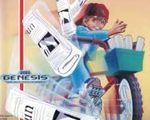
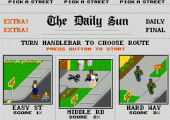
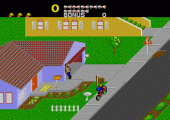
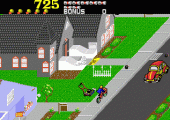
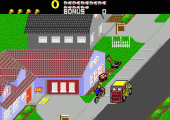
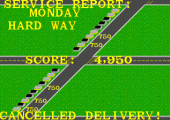
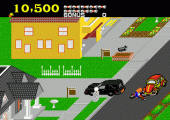
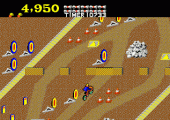
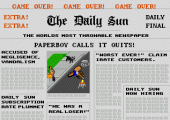
Recent Comments